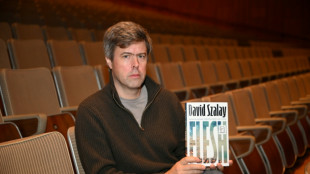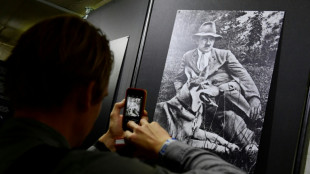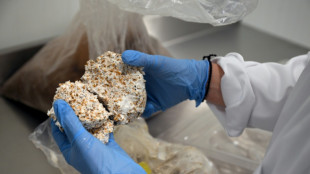
-
 Race for first private space station heats up as NASA set to retire ISS
Race for first private space station heats up as NASA set to retire ISS
-
France lifts travel ban on Telegram founder Durov

-
 Quesada sticks with Italy's Wallabies heroes for Springboks Test
Quesada sticks with Italy's Wallabies heroes for Springboks Test
-
Amazon robotics lead casts doubt on eye-catching humanoids

-
 Springboks ring changes for Italy clash
Springboks ring changes for Italy clash
-
How embracing 'ickiness' helped writer Szalay win Booker Prize

-
 World oil market 'lopsided' as supply outpaces demand: IEA
World oil market 'lopsided' as supply outpaces demand: IEA
-
Alldritt 'takes up the torch' for France against Fiji after South Africa loss

-
 Hitler likely had genetic condition limiting sexual development: research
Hitler likely had genetic condition limiting sexual development: research
-
Zelensky sanctions associate as corruption scandal engulfs Kyiv

-
 Germany agrees to keep military service voluntary
Germany agrees to keep military service voluntary
-
Japan PM Takaichi says she sleeps only 2-4 hours a night

-
 South Africa announces plan to bid for Olympic Games
South Africa announces plan to bid for Olympic Games
-
Juan Ponce Enrile, architect of Philippines martial law, dies at 101

-
 Stocks waver as US government shutdown ends
Stocks waver as US government shutdown ends
-
Google to pay millions to South African news outlets: watchdog

-
 EU probes Google over news site rankings despite Trump threats
EU probes Google over news site rankings despite Trump threats
-
Pakistan grants lifetime immunity to president, current army chief

-
 South Africa's Bavuma says winning in India top ambition
South Africa's Bavuma says winning in India top ambition
-
Alldritt back to captain France against Fiji after South Africa loss

-
 Juan Ponce Enrile, architect of Philippine martial law, dies at 101: daughter
Juan Ponce Enrile, architect of Philippine martial law, dies at 101: daughter
-
'Ready' Rees-Zammit back in Wales's starting team to face Japan

-
 Spinners decide Tests in India, Gill says before South Africa opener
Spinners decide Tests in India, Gill says before South Africa opener
-
K-pop group NewJeans ends feud with record label ADOR

-
 Asian stocks rise with focus on Fed, tech as US government reopens
Asian stocks rise with focus on Fed, tech as US government reopens
-
UK economic gloom deepens before budget

-
 Scott Barrett returns to skipper All Blacks against England
Scott Barrett returns to skipper All Blacks against England
-
Burberry narrows first half loss on turnaround plan

-
 Sri Lanka to stay in Pakistan after bomb, games move to Rawalpindi
Sri Lanka to stay in Pakistan after bomb, games move to Rawalpindi
-
Zanzibar women turn to sponge farming as oceans heat up

-
 Stocks rise with focus on Fed, tech as US government reopens
Stocks rise with focus on Fed, tech as US government reopens
-
Curry lifts Warriors over Spurs, Thunder rout Lakers, Jokic shines

-
 Mushroom material takes on plastic packaging at Belgian start-up
Mushroom material takes on plastic packaging at Belgian start-up
-
India's top tennis player says denied China visa

-
 In Kyrgyzstan, world's largest natural walnut forest thins away
In Kyrgyzstan, world's largest natural walnut forest thins away
-
TV soaps and diplomacy as Bangladesh and Turkey grow closer

-
 Striking Boeing defense workers to vote on latest contract
Striking Boeing defense workers to vote on latest contract
-
Australia's opposition ditches commitment to net zero emissions

-
 Duffy takes four as New Zealand crush West Indies to seal T20 series
Duffy takes four as New Zealand crush West Indies to seal T20 series
-
South Korea halts flights for college entry exam

-
 Trump signs bill to end record-breaking US shutdown
Trump signs bill to end record-breaking US shutdown
-
EU lawmakers to vote on unpicking green business rules

-
 Smith says England speed kings could struggle in Ashes
Smith says England speed kings could struggle in Ashes
-
Stocks stutter with focus on Fed, tech after US reopen vote

-
 Record-breaking US shutdown ends as political fallout begins
Record-breaking US shutdown ends as political fallout begins
-
France marks decade since harrowing Paris attacks

-
 Skubal, Skenes win MLB Cy Young Awards for top pitchers
Skubal, Skenes win MLB Cy Young Awards for top pitchers
-
Record rains turn Argentina's farm-filled Pampas plains to wetlands

-
 Solar storm brings new chance of vivid auroras, signal disruptions
Solar storm brings new chance of vivid auroras, signal disruptions
-
Gauff and Fritz back for United Cup against Swiatek's Poland


How embracing 'ickiness' helped writer Szalay win Booker Prize
Writer David Szalay deliberately dared his readers to face up to the "ickiness" of an affair between a 15-year-old boy and his much older married neighbour in the first chapter of his new book, "Flesh".
And it worked, winning him Britain's top literary award the Booker Prize this week with his "extraordinary" story of a Hungarian immigrant who worked -- and slept -- his way up the greasy pole in London after starting out as a bouncer.
The 51-year-old British Hungarian author -- who narrowly lost out on the £50,000 ($65,500) prize in 2016 -- has been quietly building a reputation for his stripped back, realist fiction which often explores themes of masculinity and migration.
Szalay laughed when told that a reader said online that they were grossed out by his protagonist Istvan losing his virginity to an older woman at the start of the book.
"I think the first chapter -- even though it's quite shocking and graphic and sort of icky to some people -- will draw you into the book," he told AFP.
"There was a feeling that I was taking a bit of a risk with the book and the publishers also, I think, felt that," Szalay said.
"Flesh" follows the rise and fall of Istvan, a laconic Eastern European immigrant everyman who leaves his poor housing estate in Hungary to make his fortune in London, rising to become a rich socialite, his life shaped by events seemingly beyond his control.
"The central character is quite opaque in many ways, he doesn't really explain himself to the reader. So I wasn't quite sure how they were going to respond to him until the book was actually published," Szalay said.
Even its title, "Flesh", "made people slightly uneasy", he admitted, with its "almost vulgar feeling".
The German publishers went with "What Cannot Be Said", Szalay said. It is "a very different approach but, but... it speaks to another aspect of the book which is very real."
- Story would 'never happen post-Brexit' -
Like Istvan, Szalay uses words sparingly, and he also wanted him to be someone like him, who was "stretched" between Hungary and Britain.
Born in Canada to a Hungarian father, Szalay grew up in Britain before moving to Hungary. He now lives in neighbouring Austria with his family.
"I'll never really feel entirely at home in Hungary," Szalay said, adding that he had also "lost touch" with London after moving away.
"So I wanted to write a book that had an English aspect and a Hungarian aspect and a character who wasn't quite at home in either place."
The narrative unfolds around the time that Hungary joined the European Union in the early 2000s, opening the door for people like Istvan to migrate west in search of a better life.
However, the adventures and misadventures of a working-class Hungarian would have been very different in a post-Brexit world, Szalay said.
"The story in Britain wouldn't happen post-Brexit," the author said.
It would probably "take place in Germany" now, he laughed.
Szalay was shortlisted for the Booker in 2016 for "All That Man Is", which traces the often lonely internal lives of nine different men.
With "Flesh", he once again explores male alienation in a novel punctuated by uneasy, revealing silences that critics have praised for attempting to reach the "edge of language".
"While the book is undeniably about masculinity in some way, I wouldn't want that to be the dominant focus," insisted Szalay, who has said he removed explicit references to masculinity to open the book up to interpretation.
Instead, he wanted to craft a work that was both "immediately contemporary" but that had elements of Greek tragedy.
Szalay, who is already working on something new, said being pipped for the Booker by the American Paul Beatty prepared him to deal with winning this time.
"In retrospect, that was probably a blessing," he said.
R.Shaban--SF-PST

